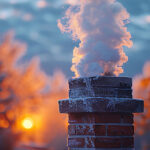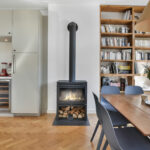
Understanding the Dangers of Creosote in Your Chimney
December 3, 2024
Which Chimney Liner is Best for Your Stove?
March 31, 2025When it comes to maintaining your chimney, safety and efficiency should be top priorities. Proper insulation not only helps protect the structure of your chimney but also enhances its performance, ensuring a safer and more effective heating system. Using high-quality insulation materials like vermiculite, rockwool, and Flexwrap can significantly improve heat retention, prevent damage, and optimise airflow. In this blog, we’ll explore the key benefits of chimney insulation and why it should be a crucial part of your installation or maintenance plan.
Enhancing Heat Retention
Vermiculite is a naturally occurring mineral renowned for its excellent insulating properties. When applied within a chimney’s flue liner, it helps retain heat inside the chimney, reducing heat loss into surrounding areas. This not only improves the efficiency of your heating system but also protects the chimney from extreme temperature fluctuations that can cause structural damage. Additionally, by maintaining a higher internal temperature, vermiculite reduces the likelihood of creosote buildup, which is a major cause of chimney fires.
Protecting Against Corrosion
Chimneys are constantly exposed to moisture and corrosive by-products from combustion, which can lead to deterioration over time. Flexwrap, a flexible, non-combustible insulation material, acts as a protective barrier, shielding the chimney liner from moisture and acidic condensation. By preventing corrosion and extending the lifespan of your chimney, Flexwrap helps maintain the integrity of your heating system for years to come.
Reducing Condensation Risks
Condensation is a common issue in chimneys, especially in areas where temperatures fluctuate. When warm flue gases encounter a cold chimney liner, moisture condenses on the inner walls, leading to creosote formation. Vermiculite and rockwool insulation work to stabilise the chimney’s internal temperature, reducing condensation and minimising creosote buildup. Rockwool wraps around the flexible liner, further decreasing the risk of moisture-related issues and enhancing overall chimney performance.
Optimising Draft and Airflow
A properly insulated chimney promotes efficient draft and airflow, which are critical for the smooth operation of your stove or fireplace. Flexwrap and rockwool can be used to seal gaps and cracks in the chimney liner, preventing unwanted air leaks that could cause backdrafts or smoke intrusion. Improved airflow means better combustion, more efficient fuel use, and reduced emissions—helping you save on heating costs while keeping your home warm and safe.
Meeting Safety and Compliance Standards
Building regulations and safety codes often require that chimneys be properly insulated to reduce fire hazards and improve energy efficiency. By using vermiculite, rockwool, or Flexwrap, homeowners can ensure compliance with industry standards while enhancing their chimney’s performance. Investing in proper insulation not only safeguards your home but also provides peace of mind knowing that your heating system meets all necessary safety requirements.
The Importance of Chimney Insulation
Chimney insulation is not just about efficiency – it’s about safety, longevity, and optimal performance. By insulating your chimney with materials like vermiculite, rockwool, and Flexwrap, you can prevent heat loss, reduce condensation, protect against corrosion, and improve draft efficiency. Whether you’re installing a new chimney or upgrading an existing one, prioritising insulation is a smart decision that will benefit both your home and your wallet in the long run.
Don’t overlook this essential component – your chimney will thank you for it!


